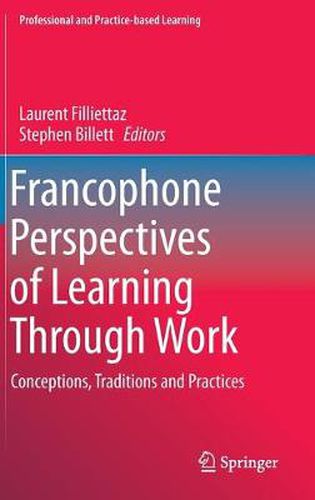Readings Newsletter
Become a Readings Member to make your shopping experience even easier.
Sign in or sign up for free!
You’re not far away from qualifying for FREE standard shipping within Australia
You’ve qualified for FREE standard shipping within Australia
The cart is loading…






This title is printed to order. This book may have been self-published. If so, we cannot guarantee the quality of the content. In the main most books will have gone through the editing process however some may not. We therefore suggest that you be aware of this before ordering this book. If in doubt check either the author or publisher’s details as we are unable to accept any returns unless they are faulty. Please contact us if you have any questions.
This book generates a comprehensive account of ways in which practice-based learning has been conceptualized in the Francophone context. Learning for occupations, and the educational and practice-based experiences supporting it are the subject of increased interest and attention globally. Governments, professional bodies, workplaces and workers are now looking for experiences that support the initial and ongoing development of occupational capacities. Consequently, more attention is being given to workplaces as sites for this learning. This focus on learning through work has long been emphasised in the Francophone world, which has developed distinct traditions and conceptions of associations between work and learning. These include ergonomics and professional didactics. Yet, whilst being accepted and of long standing in the Francophone world, these conceptions and traditions, and the practices supporting them are little known about or understood in the Anglophone world, which is the dominant medium for scientific and educational discussion. This book addresses this problem through drawing on accounts from France, Switzerland and Canada that make accessible and elaborate these traditions, conceptions and practices through examples of their applications to occupationally related learning. These accounts offer variations and culturally-specific developments of these traditions, but collectively emphasize a preoccupation with how both work and learning need to be understood through situated considerations of persons enacting their work practice. In this way, they offer noteworthy and worthwhile contributions to contemporary global considerations of learning through work.
$9.00 standard shipping within Australia
FREE standard shipping within Australia for orders over $100.00
Express & International shipping calculated at checkout
This title is printed to order. This book may have been self-published. If so, we cannot guarantee the quality of the content. In the main most books will have gone through the editing process however some may not. We therefore suggest that you be aware of this before ordering this book. If in doubt check either the author or publisher’s details as we are unable to accept any returns unless they are faulty. Please contact us if you have any questions.
This book generates a comprehensive account of ways in which practice-based learning has been conceptualized in the Francophone context. Learning for occupations, and the educational and practice-based experiences supporting it are the subject of increased interest and attention globally. Governments, professional bodies, workplaces and workers are now looking for experiences that support the initial and ongoing development of occupational capacities. Consequently, more attention is being given to workplaces as sites for this learning. This focus on learning through work has long been emphasised in the Francophone world, which has developed distinct traditions and conceptions of associations between work and learning. These include ergonomics and professional didactics. Yet, whilst being accepted and of long standing in the Francophone world, these conceptions and traditions, and the practices supporting them are little known about or understood in the Anglophone world, which is the dominant medium for scientific and educational discussion. This book addresses this problem through drawing on accounts from France, Switzerland and Canada that make accessible and elaborate these traditions, conceptions and practices through examples of their applications to occupationally related learning. These accounts offer variations and culturally-specific developments of these traditions, but collectively emphasize a preoccupation with how both work and learning need to be understood through situated considerations of persons enacting their work practice. In this way, they offer noteworthy and worthwhile contributions to contemporary global considerations of learning through work.